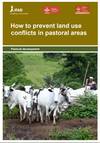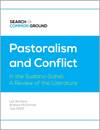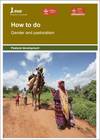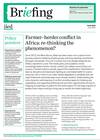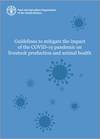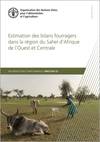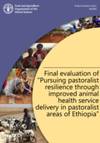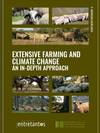This How-to-do Note focuses on how conflicts over land and natural resources in pastoral areas can be prevented or, if already present, transformed into positive outcomes. It identifies why land tenure is a complex issue within pastoralism, discusses the combination of factors that are contributing to more insecure pastoral tenure and triggering pastoral area conflicts, and introduces some of the frameworks, tools and approaches that can be used as part of project design to reduce the potential for conflict.
Year of publication: 2020Organization: Fonds international de développement agricole (FIDA)
Topic: Conflit, Régime foncier
Language: English
Type of document: Technique
Geographical coverage: Global
From Mali to South Sudan, governments, regional bodies, peacebuilders, development agencies, environmentalists, economists, and security forces are actively attempting to address the sources of violence and instability that affect both pastoral communities and the rural societies with whom they share resources and landscapes. These interventions are often shaped by differing assumptions about the source and nature of these conflicts, despite the availability of extensive research and analysis. Though the local dynamics of conflict vary across different contexts, a number of trends and debates appear throughout the literature on pastoralism and conflict. This review draws on several hundred sources to synthesize the major points of consensus and divergence in the existing literature and identify relevant research gaps. This analysis presents data from across Sudano-Sahelian West and Central Africa, to link comparable findings that are often presented in isolation.
Year of publication: 2020Organization: Auteurs individuels
Topic: Conflit, Résilience
Language: English
Type of document: Technique
Geographical coverage: Afrique occidentale, Afrique centrale
This HTDN complements the IFAD Toolkit and HTDN on Pastoralism produced in 2018, which highlights the importance of gender in pastoral production systems. This How To Do Note (HTDN) on Gender and Pastoralism builds on this introduction highlighting important issues and tools to use to address them. This HTDN is designed for country programme teams, consultants and technical advisors, with the objective of providing guidance on the designing of projects with gender-sensitive interventions targeted at empowering pastoralist women so as to achieve more equitable development. This HTDN is divided into two main sections. Section One identifies the issues that particularly impact pastoralist women and related gender issues and highlights the need for greater women’s empowerment. It introduces the relevant IFAD policies and publications that have helped broaden understanding of gender issues within pastoralism and brings in lessons learned from other agencies. Section Two provides practical guidance that project developers and others can use for more gender-sensitive interventions with pastoralists. Reference materials, as well as gender-focused tools and checklists that can help in project development, are also provided.
Year of publication: 2020Organization: Fonds international de développement agricole (FIDA)
Topic: Jeunesse et égalité des sexes
Language: English
Type of document: Technique
Geographical coverage: Global
Le pastoralisme est jugé comme perturbateur et rétrograde, livrant une bataille perdue d’avance la conquête de ressources trop rares. Pourtant, en vérité, c’est une méthode sous-estimée d’adaptation à la variabilité qui peut rendre les moyens d’existence et les paysages plus résilients face au climat. Il est essentiel de comprendre les racines, la dynamique et la signification du conflit, de prévoir un espace pour comprendre et négocier, et de soutenir les moyens d’existence et les débouchés économiques afin de dégager des trajectoires vers la paix pour l’ensemble de la région.
Year of publication: 2020Organization: Institut international pour l'environnement et le développement (IIED)
Topic: Conflit
Language: Français
Type of document: Politiques et législation
Geographical coverage: Afrique occidentale
Guidelines to mitigate the impact of the COVID-19 pandemic on livestock production and animal health
The purpose of these guidelines is to describe the impact of COVID-19 on livestock production and animal disease prevention and control, and to provide practical recommendations for actors along value chains to reduce this impact and ensure continuity of the livestock supply chain and animal health. The target beneficiaries of these guidelines are livestock value chain actors including livestock farmers, slaughterhouse workers, animal product processors, traders, animal health professionals and paraprofessionals, policy makers and other relevant stakeholders.
Year of publication: 2020Organization: Organisation des Nations Unies pour l'alimentation et l'agriculture (FAO)
Topic: Sécurité alimentaire
Language: English
Type of document: Technique
Geographical coverage: Global
Un bilan fourrager évalue les ressources en aliments pour animaux, y compris les fourrages, et les compare aux besoins des animaux d’élevage. Il fournit des informations aux décideurs politiques, aux producteurs et aux acteurs du secteur de l’élevage en général afin d’améliorer leur planification et leur évaluation du secteur. Dans la région du Sahel, le bilan fourrager est un outil essentiel pour les systèmes d’alerte précoce. Il est conçu et utilisé par les services techniques des pays sahéliens comme outil prospectif établi en fin d’année pour couvrir la saison sèche à venir. Ces directives pour établir des bilans fourragers tiennent compte des spécifictés des systèmes pastoraux et agropastoraux du Sahel que sont la saisonnalité des disponibilités fourragères et des performances animales, la part majoritaire des fourrages grossiers dans les rations et la mobilité des animaux et des pasteurs.
Year of publication: 2020Organization: Organisation des Nations Unies pour l'alimentation et l'agriculture (FAO)
Topic: Sécurité alimentaire, Innovation
Language: Français
Type of document: Technique
Geographical coverage: Afrique occidentale, Afrique centrale
Small ruminants are the main source of livelihood for the rural agropastoralists and are important assets in lowlands and highlands of Ethiopia. Transboundary animal diseases (TADs) are a significant cause of reduced production and productivity to the pastoral communities in Ethiopia. TADs like Peste des Petits Ruminants (PPR), Sheep and Goat Pox (SGP) and Contagious Caprine Pleuropneumonia (CCPP) have contributed to a high level of sheep and goat mortality, especially in lambs and kids. The “Pursuing pastoralist resilience through improved animal health service delivery” project implemented by FAO between 2014 and 2020, was designed to support the Government of Ethiopia in strengthening the surveillance system for most TADs. The project had a primary focus to implement a progressive control programme for Peste des Petits Ruminants (PPR).
Year of publication: 2020Organization: Organisation des Nations Unies pour l'alimentation et l'agriculture (FAO)
Topic: Résilience, Services sociaux
Language: English
Type of document: Technique
Geographical coverage: Afrique orientale
This technical report compiles and organises an intense shared effort to address the role of grazing in adaptation and fighting against climate change. The report collects up-to-date technical and scientific information about greenhouse gases behaviour in pastoralist systems, their emissions, their relationship with grazed ecosystems, their coping capacity and their potential to mitigate the effects of climate change.
Year of publication: 2020Organization: Auteurs individuels
Topic: Changement climatique
Language: English, Español
Type of document: Technique
Geographical coverage: Global


